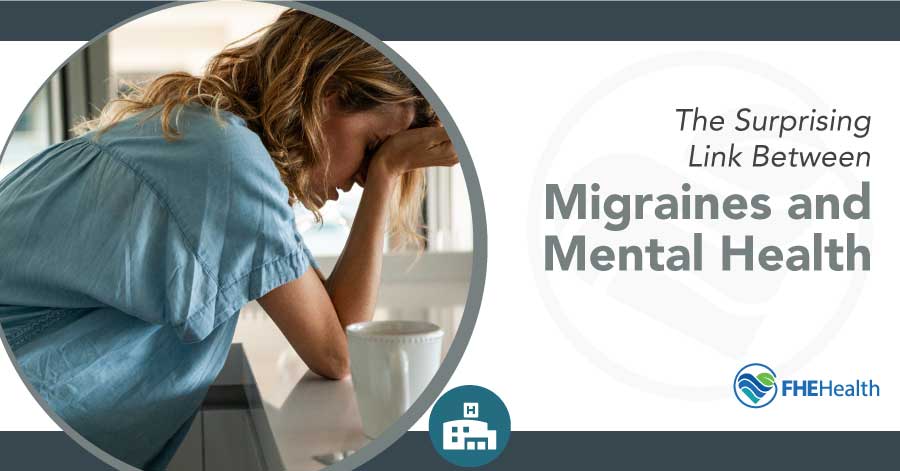
Are you one of the 36 million Americans who suffer from migraines? According to the Migraine Research Foundation, migraines are the third most common health disorder in the world. What you may not know is that there’s a strong scientific link between migraines and mental health.
Migraines are more than just headaches. They can be a sign of an underlying mental health condition or can be so severe that they cause mental health issues. People who suffer from migraines are twice as likely to report mental health problems.
The Mind-Body Connection
The mind-body connection is an ancient concept that has been explored by thinkers for centuries. The idea is simple: Our thoughts and emotions can have a direct impact on our physical health. This concept has been explored in detail in the field of psychology and more recently has been the subject of rigorous scientific research. Studies have shown that stress and anxiety can lead to a wide range of physical health problems, including migraines, heart disease, and gastrointestinal problems. While the exact mechanisms behind the mind-body connection are still not fully understood, there’s no doubt our mental health has a direct impact on our physical well-being.
The Link Between Migraines and Mental Health Problems
For many people, migraines are more than just occasional head pain. These severe, debilitating headaches can last for hours or even days and can make it impossible to carry out normal activities. Migraines are often accompanied by symptoms like nausea, light sensitivity, and dizziness.
Migraines and mental health disorders seem to be related. Studies have shown that anxiety and depression are common among migraine sufferers.
People who suffer from migraines are three times more likely to suffer from depression, especially if the headaches are regular. Anxiety affects 30% to 50% of people who suffer from chronic migraines and 20% of those who suffer from episodic headaches. There’s also evidence that migraines and bipolar illness commonly co-occur.
While the exact reason for this link is uncertain, it’s clear that migraines can take a serious toll on both physical and mental health.
What Can Explain This?
A few clinical theories for the relationship between migraines and mental health have been presented by scientists. Migraines and mental disorders are frequently bidirectional, meaning that it’s unclear if migraines directly affect your mental health or whether they’re just produced by comparable processes.
What Is a Migraine?
A migraine headache is characterized by a strong throbbing pain or pulsating feeling, typically felt on one part of the head. It’s frequently accompanied by nausea, vomiting, and hypersensitivity to light and sound. Migraine attacks can persist for hours or days, and the pain can be severe enough to interfere with everyday tasks.
A warning sensation known as an aura develops before or with the headache in some people. Auras can involve visual abnormalities like flashes of light or blind patches, as well as physical symptoms including tingling on one side of the face, arm, or leg and difficulties speaking.
Symptoms of Migraines
Migraines may afflict both children and adults and tend to develop through four progressive stages: prodrome, aura, attack, and post-drome. However, not everyone who suffers from migraines will experience these four stages. One or two days before a migraine, you may notice minor changes that indicate an impending migraine, such as:
Prodrome
- Constipation
- Changes in mood
- Cravings for food
- Neck tension
- Increased need to urinate
- Fluid retention
- Yawning often
Aura
Auras are reversible nervous system symptoms and can occur before or during migraines. They’re often visual but can sometimes involve other senses. Each symptom often develops gradually over several minutes and may last up to an hour.
A few examples of migraine auras are:
- Visual phenomena such as perceiving different forms, bright spots, or light bursts
- Loss of vision
- Pins and needles in limb
- Weakness or numbness on one side
- Difficulty speaking
Attack
- The attack is the migraine itself and typically has the following characteristics:
- Severely painful
- Lasts between 4 and 72 hours
- Hypersensitivity to light, sounds and smells
- Nausea
- Lightheadedness
Migraine attacks can be extremely distressing, and people may find these experiences traumatic. This may be one of the factors negatively influencing mental health. Through conditioning, people may begin to feel helpless, fearful of attacks, or anxious.
If you’re struggling with migraines and feel they may be causing your mental health to worsen, it may be helpful to seek professional medical and psychological help.
Post-Drome
The postdrome stage of migraines is often referred to as the migraine hangover. It usually lasts for 24-48 hours after the pain of the migraine has subsided. During this time, people may feel drained and fuzzy-headed. It’s not uncommon to experience mood swings, fatigue, and difficulty concentrating. Some people find their sense of smell is heightened during the postdrome stage.
Although the exact cause of these symptoms is unknown, it’s thought that they may be due to changes in brain activity that occur during a migraine. For most people, the postdrome stage isn’t overly bothersome and will resolve on its own within a few days.
Getting Help
Our minds and bodies are inherently connected, and migraines and mental health are often intertwined. Migraines can cause debilitating pain and may result in the onset of mental health issues. They may also be an indication of an underlying mental health problem.
If you’re struggling with migraines and mental health problems, it’s important to seek help from a healthcare professional. FHE Health has a number of inpatient and outpatient clinics that can help you. Our medical and psychology professionals are standing by to take your call. Contact us today at (833) 596-3502.






